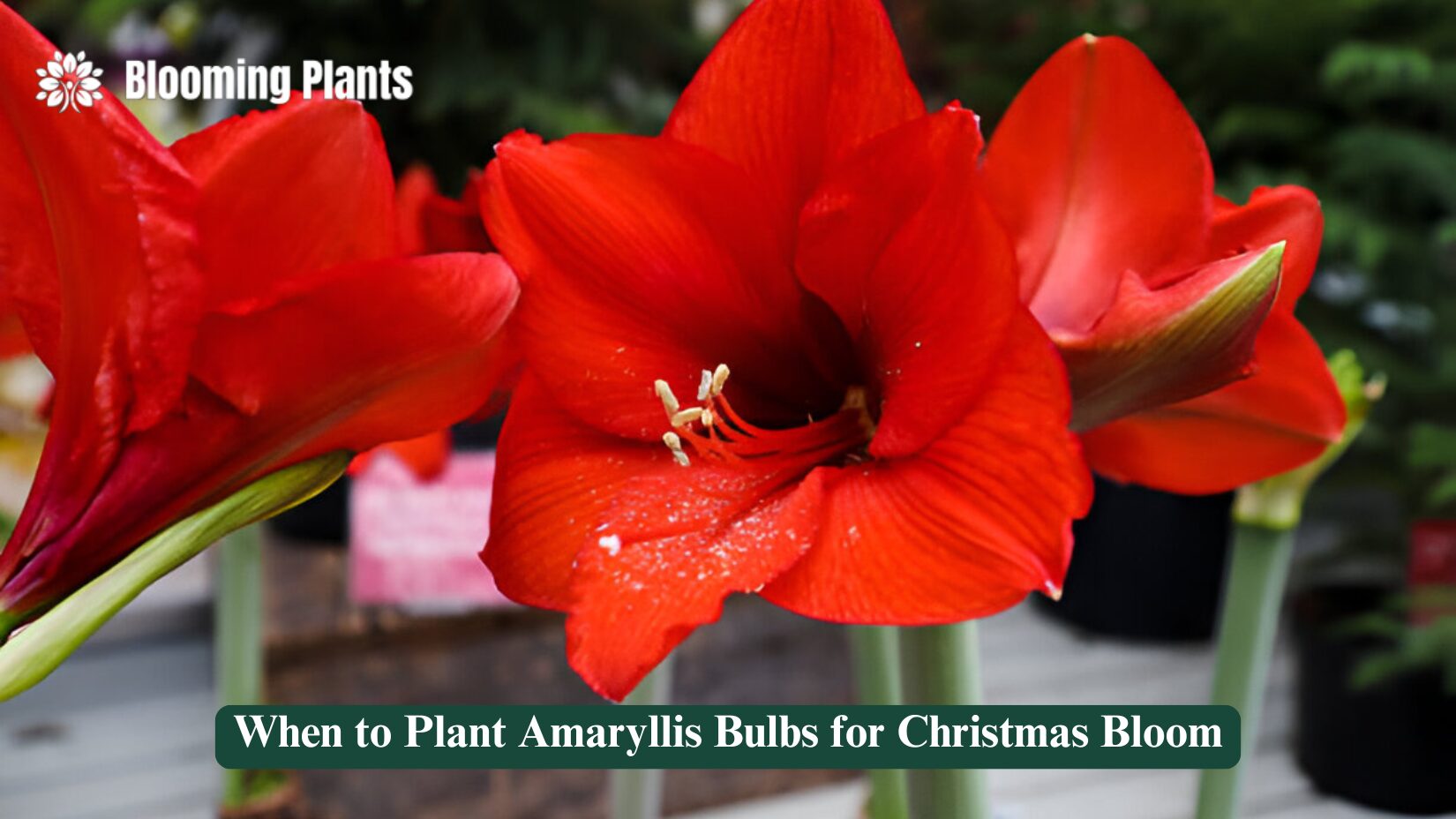Introduction
Amaryllis bulbs are a holiday favourite, known for their large, vibrant blooms that add festive cheer to any home. To achieve stunning flowers just in time for Christmas, timing is everything. Understanding when and how to plant these bulbs ensures a spectacular display during the holiday season. This guide covers everything you need to know about planting amaryllis bulbs for a perfect Christmas bloom.
Understanding Amaryllis Growth Cycle
The Dormancy Period
Amaryllis bulbs require a period of dormancy to reset and prepare for blooming. This phase typically lasts 8–10 weeks.
Active Growth Stage
After dormancy, bulbs enter an active growth stage where leaves and flower stalks develop rapidly.
Blooming Phase
The final phase is the blooming period, where vibrant flowers emerge, lasting for several weeks.
Choosing the Right Amaryllis Bulbs
Quality Matters
Select firm, healthy bulbs free from mold or soft spots to ensure strong growth.
Size of the Bulb
Larger bulbs generally produce more substantial blooms, making them ideal for holiday displays.
Varieties for Christmas Bloom
Popular varieties like ‘Red Lion’ and ‘Apple Blossom’ are perfect choices for festive decor.
Optimal Planting Time for Christmas Bloom
Counting Back from Christmas
Plant bulbs 6–8 weeks before the desired bloom date to ensure timely flowering.
Regional Considerations
Consider your local climate, as indoor growing conditions may vary slightly based on external temperatures.
Adjusting for Late Starters
If you’re planting late, use techniques like warmer environments to speed up growth.
Preparing Amaryllis Bulbs for Planting
Pre-Planting Soak
Soak the bulb roots in lukewarm water for a few hours to stimulate growth.
Choosing the Right Pot
Use a pot slightly larger than the bulb with drainage holes to prevent waterlogging.
Soil Preparation
Opt for well-draining potting mix enriched with organic matter for optimal growth.
How to Plant Amaryllis Bulbs
Depth and Positioning
Plant the bulb with one-third exposed above the soil to prevent rot and encourage strong stems.
Watering After Planting
Water sparingly until growth appears, then gradually increase as the plant develops.
Placement for Optimal Growth
Place in a bright, warm location to encourage sprouting and healthy growth.
Caring for Amaryllis During Growth
Light Requirements
Provide bright, indirect sunlight to promote strong, upright flower stalks.
Watering Schedule
Keep the soil moist but not soggy; overwatering can cause bulb rot.
Fertilizing Tips
Feed with a balanced liquid fertilizer every 2-3 weeks during the active growth phase.
Encouraging Timely Blooms
Temperature Control
Maintain temperatures between 60-70°F to support healthy growth and timely blooming.
Rotating the Pot
Rotate the pot regularly to ensure even growth and prevent leaning.
Supporting Tall Stems
Use stakes if necessary to support tall flower stalks as they develop.
Troubleshooting Common Issues
Delayed Blooming
Ensure the bulb received adequate dormancy and consistent warmth after planting.
Drooping Stems
Lack of light or overwatering can cause weak stems; adjust conditions accordingly.
Pests and Diseases
Watch for common pests like aphids and treat promptly with insecticidal soap.
Extending Bloom Time
Managing Light and Temperature
Cooler temperatures can extend bloom duration; avoid placing near heat sources.
Deadheading Spent Flowers
Remove faded blooms to redirect energy to remaining buds.
Post-Bloom Care
After blooming, continue to care for the plant to prepare it for future flowering cycles.
Storing Bulbs for Future Blooms
Post-Bloom Dormancy
Allow the foliage to die back naturally before storing the bulb in a cool, dry place.
Proper Storage Conditions
Store bulbs at 50-55°F in a dark, well-ventilated area to maintain dormancy.
Replanting for the Next Season
Replant the bulb after 8–10 weeks of dormancy to initiate the next growth cycle.
Amaryllis Care for Year-Round Blooms
Managing Multiple Bloom Cycles
With proper care, some amaryllis can bloom more than once a year.
Outdoor vs. Indoor Care
Adapt care routines based on whether the plant is kept indoors or transitioned outside during warmer months.
Fertilization for Continuous Growth
Regular feeding promotes healthy leaves and future flowering potential.
Table: Amaryllis Planting Timeline for Christmas Bloom
| Task | Timeline Before Christmas | Details |
| Purchase Bulbs | 12 weeks | Choose healthy, large bulbs |
| Start Dormancy Period | 10 weeks | Cool, dark storage |
| Plant Bulbs | 6-8 weeks | Bright location, minimal water |
| Active Growth Phase | 4-6 weeks | Increase watering, add fertilizer |
| Bloom Period | Christmas Week | Enjoy festive blooms! |
Conclusion
Planting amaryllis bulbs for Christmas bloom requires careful planning and attention to detail. By understanding the growth cycle, choosing the right planting time, and providing optimal care, you can enjoy stunning, vibrant flowers just in time for the holidays. Whether you’re a seasoned gardener or a beginner, following these steps ensures your amaryllis will be the highlight of your festive decor.
FAQs
1. When should I plant amaryllis bulbs for Christmas bloom?
Plant them 6–8 weeks before Christmas, ideally in early November.
2. Can I force amaryllis to bloom faster?
Yes, by keeping the bulbs in a warmer environment and providing ample light.
3. Do amaryllis bulbs need to be refrigerated?
No, but they require a cool dormancy period to trigger blooming.
4. How often should I water after planting?
Water sparingly until growth appears, then keep the soil moderately moist.
5. Can I reuse amaryllis bulbs?
Yes, with proper post-bloom care, bulbs can bloom annually.
6. Why are my amaryllis leaves long but no flowers?
The bulb may not have had sufficient dormancy or light during growth.
7. How do I prevent my amaryllis from leaning?
Rotate the pot regularly and ensure it receives bright, indirect light.
8. What temperature is best for amaryllis growth?
Maintain 60-70°F for optimal growth and blooming.
9. How can I extend the bloom period?
Keep the plant in a cooler spot away from direct heat sources.
10. Should I fertilize my amaryllis after it blooms?
Yes, to help the bulb store energy for future growth.

